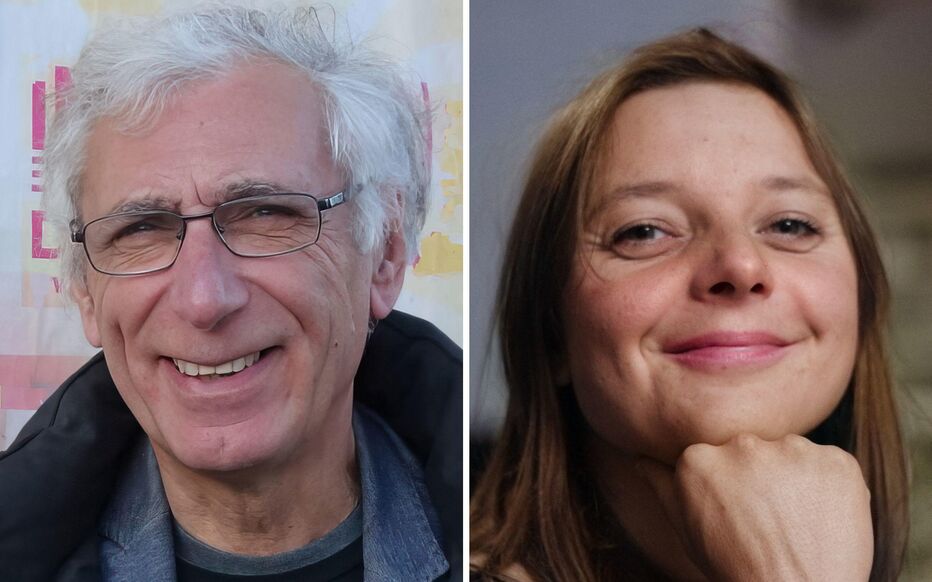
Narges Mohammadi Speaks to Le Parisien About the Situation of Cécile and Jacques
In an interview with Le Parisien, Iranian Nobel Peace Prize laureate Narges Mohammadi expressed her deep concern for the situation of Cécile and Jacques.
“I am deeply worried about Cécile and Jacques. Firstly, because their charge has changed — from spying for France to spying for Mossad. Spying for Mossad now, especially after the recent Israeli attacks on Iran, could have very serious consequences for these two,” Mohammadi said.
She added, “Secondly, I am worried about them because they have been held in security wards, in solitary confinement, for almost three years. Naturally, when a prisoner stays in solitary for such a long time, their strength, physical health, and mental well-being are severely damaged. So after three years of enduring solitary confinement, Cécile and Jacques are now facing extremely serious charges with very dangerous consequences.”
“Even to use the bathroom or take a shower,
which is allowed no more than three times a day,
you must have the guard’s permission and for a very short time.” said Narges Mohammadi.
Mohammadi emphasized that the conditions will only become harder for them. “This situation will definitely become even more fragile and difficult for them. From the day Cécile was brought to Ward 209, we learned through friends — people who were transferred from Ward 209 to the general prison ward, where we were held — we used to hear news about them. From that time, we knew that Cécile was under a lot of pressure in solitary,” she said.
“Imagine being in solitary confinement there:
when they put a prisoner in solitary,
they don’t even have access to fresh air.” said Narges Mohammadi.
Recalling her own experience, Mohammadi explained, “Around Azar month (November-December), after my surgery and even some time before that, when my friends — when the women prisoners came from Ward 209 — I would ask them, and they kept saying that Cécile had become very weak. Mentally and emotionally too — because of the conditions in Ward 209 and the pressure they were under — she was very affected psychologically. Physically she had become very weak, and now I am really worried about Cécile’s physical condition too.”
“There’s no access to personal items — you’re just left in a small cell, sitting on a thin rug, constantly under threats and pressure from security forces. We went through this ourselves when we were in solitary — I’ve been in security wards four times, and the conditions are extremely terrifying.”
She continued, “Some friends who came from Ward 209 would say they spent a few hours or a few days in the same cell with Cécile. They spoke about her very warm and kind spirit. They talked about how caring and compassionate she was towards others, despite her own difficult situation. But the reality is that Cécile has spent a very long time in solitary, and right now, I don’t know how she is doing.”
“Look, in Evin Prison, when we were held in solitary cells in security detention —
the same place where Cécile and Jacques have been — the conditions were extremely harsh.
It’s almost unbearable.” said Narges Mohammadi.
Look, in Evin Prison, as long as we were held in solitary confinement in the security detention wards — the same place where Cécile and Jacques were held — the conditions were extremely harsh and almost unbearable. When a detainee is put in solitary, they don’t even have access to fresh air. Even for using the bathroom or taking a shower, they need explicit permission from the prison guards and only for a very limited time.
In solitary, you have no access to personal belongings. You just sit on a thin carpet in a small cell, constantly under security threats. I have personally been sent to security wards four times. The conditions there are terrifying. The last time, when I was held in the solitary cells of Ward 209 for sixty-four days, I suffered a heart attack twenty-four days after I was transferred to Qarchak Prison. The mental and physical pressure in solitary is unbearable, and surviving it is incredibly difficult.
After that, we were transferred to the general wards, where many political and security prisoners are held. Conditions there are different from security detention: there, prisoners can cook, exercise, and walk in the yard. But in solitary cells, none of this exists. I am deeply concerned about the prisoners who were in Evin and have now been transferred elsewhere, because their lives have been turned upside down — especially those still in solitary, whose whereabouts remain unknown.
Just as a hospital cannot be considered a legitimate military target in war, I believe prisons are even more vulnerable. Prisoners are locked behind closed doors, under tight security control. Guards and security forces might have a chance to escape or protect themselves in an attack, but prisoners have no means to flee. That’s why I believe the attack on Evin cannot be justified under any pretext and must be condemned — prisoners definitely suffered in this incident.
We have information that some prisoners’ families who went to Evin’s courthouse or the visitation hall to see their loved ones were killed. The fact that the charges against Jacques and Cécile were suddenly changed from spying for France to spying for Mossad after Israel’s attack on Iran shows just how dependent Iran’s judiciary is on the security apparatus — it has no independence at all. It’s unacceptable that for three years these two French nationals were imprisoned on charges of spying for France, and then overnight they are accused of spying for Mossad.
This is part of the Islamic Republic’s hostage-taking policy — using dual nationals or foreign citizens to pressure other governments. We’ve seen this tactic succeed many times, with citizens from the US, UK, and other countries. The regime holds them until it gets what it wants. I believe Cécile and Jacques, after three years in Evin, are now also being used to put pressure on France.
Before the Israeli attack, the Iranian people were already fighting against the Islamic Republic — a religious, authoritarian, misogynistic, and unreformable regime. Through broad social and protest movements, they demanded a transition away from the Islamic Republic. People have shown their agency in this fight, and their role in this transition to democracy is decisive.
Women have played an inspiring role in this struggle — not just in Iran and the Middle East, but globally. These movements have challenged the regime’s authority and undermined its legitimacy. In my view, it was the people’s resistance that truly weakened the regime — more than any military strike against its proxies in the region.
I believe that now, after the regime’s weakened position, the Iranian people can pursue democracy and push for real change. Together with Nobel laureate Shirin Ebadi, 22 political, civil, and human rights activists, and former prisoners like Jafar Panahi, Mohammad Rasoulof, Nazanin Zaghari, Aras Amiri, Atena Daemi, and Nahid Taghavi — all now living in different countries — we signed a statement condemning the attack on Evin Prison. Such an attack cannot be considered legitimate and may amount to a war crime.
Evin Prison held many political and ideological prisoners — women in the women’s ward and men in Wards 4, 7, and 8. Political detainees were also kept in solitary in four separate areas: Ward 209 (run by the Ministry of Intelligence, where Cécile and Jacques were held), Ward 2A (run by the IRGC), and Wards 240 and 241 (run by the judiciary’s Intelligence Protection Unit).
After the attack, these prisoners were suddenly moved to different prisons without informing their families or lawyers. Male prisoners from the general wards were sent to Greater Tehran Prison, which has deeply concerning conditions — poor sanitation, lack of medical care, and even inadequate drinking water. Prisoners there sleep on the floor, have no beds, no blankets, and in the summer heat, the lack of safe drinking water puts them at serious risk.
The women from Evin’s general ward were sent to Qarchak Prison. I spent months in Qarchak — I know it lacks the basic facilities Evin has. The water and air quality are terrible, drinking water is scarce, and women there won’t even have minimal access to cooking facilities. Many had medical files in Evin’s infirmary, but now that the infirmary has been destroyed, they’ve lost access to their treatment and medicines. Many prisoners are over seventy years old with serious health conditions — they are now in real danger.
More than the physical and medical issues, I am deeply concerned for prisoners’ safety. In a war-like or highly securitized situation, prisoners — who are entirely at the mercy of the regime’s military and security forces — are at grave risk. The atmosphere in Iran is now extremely tense and militarized. As an eyewitness in Tehran and its roads, I have personally seen IRGC, Basij, and police checkpoints set up to maintain total control over people and suppress any protests.
The Islamic Republic’s insistence on uranium enrichment has become one of the biggest international disputes, dragging on for decades, with sanctions and now war. This hasn’t strengthened the regime but has caused devastating harm to the people.
I believe the people should have the right to decide on this issue — not the regime. If there were a free and fair referendum — something impossible under the regime’s rigged elections — I am sure the people would reject uranium enrichment. The regime’s nuclear ambitions serve its own interests, not the people’s.
Iran’s nuclear program has never benefited the people — it hasn’t delivered energy, research, or medical advances as claimed. Instead, we live with daily blackouts, and the costs have been paid in lost lives, lost security, and economic hardship — now culminating in war.
I deeply believe uranium enrichment must stop — and the people must decide this for themselves to secure their own interests, not the regime’s.
And what the parliament has just passed — sending it to the Guardian Council for final approval — is truly a catastrophe. Many lawyers and legal experts agree this new bill violates even the Islamic Republic’s own laws. If approved, it will result in mass death sentences, lengthening execution queues and repeating the tragic mass executions we witnessed in the 1980s.
نرگس محمدی در گفتوگو با لوپاریزین درباره وضعیت سیسیل و ژاک:
«من عمیقاً نگران سیسیل و ژاک هستم. اولاً به این دلیل که اتهام آنها از جاسوسی برای فرانسه به جاسوسی برای موساد تبدیل شده است. جاسوسی برای موساد، آن هم حالا بعد از حملههایی که اسرائیل به ایران داشته، میتواند تبعات خیلی سنگینی برای این دو نفر داشته باشد.
در درجه دوم من نگران این دو نفر هستم، چون نزدیک به سه سال است که این دو نفر در بند امنیتی و در سلولهای انفرادی نگهداری شدهاند. خوب طبیعی است که زندانی وقتی به مدت طولانی در سلول انفرادی میماند، طاقتش، سلامت جسمی و سلامت روحی و روانیاش بهشدت آسیب میبیند. یعنی سیسیل و ژاک بعد از سه سال تحمل سلول انفرادی، الان با اتهام بسیار سنگین و با عواقب بسیار خطرناک مواجه هستند.
قطعاً این شرایط برای آنها شکنندهتر و سختتر خواهد شد. از روزی که سیسیل را آوردند در دویست و نه و ما از طریق دوستانی که از دویست و نه به بند عمومی زندان — یعنی جایی که ما نگهداری میشدیم — منتقل میشدند، خبرهایی را از آنها میشنیدیم. و از همان موقع میدانستیم که سیسیل در سلول انفرادی تحت فشار زیادی بوده.
پیش از توقف حکمم وقتی هنوز در زندان بودم، وقتی زندانیان زن از بند امنیت دویست و نه میآمدند، سؤال میکردم و آنها مرتب میگفتند که سیسیل خیلی ضعیف شده و به لحاظ روحی و روانی، هم به دلیل شرایط دویست و نه و هم به دلیل فشاری که رویشان بوده، خیلی آسیب دیده است. به لحاظ جسمی هم خیلی ضعیف شده بود و من الان نگران وضعیت جسمی سیسیل هم هستم.
بعضی از دوستانی که از بند دویست و نه میآمدند، میگفتند مثلاً چند ساعت یا چند روز با سیسیل در یک سلول بودهاند. از روحیه بسیار گرم او صحبت میکردند و از برخورد بسیار انساندوستانهاش میگفتند. اما واقعیت این است که سیسیل مدت طولانی در سلول انفرادی بوده و من الان نمیدانم حال و روزش چطور است.»
ببینید، توی زندان اوین، تا زمانی که ما توی سلولهای انفرادی بازداشتگاههای امنیتی بودیم ـ یعنی جایی که سیسیل و ژاک هم بودند ـ شرایط واقعاً خیلی سخت بود و تقریباً غیرقابل تحمل است. وقتی یک متهم را در سلول انفرادی میگذارند، حتی دسترسی به هواخوری هم ندارد. برای رفتن به توالت و حمام هم باید حتماً با اجازه زندانبان و در زمان بسیار محدودی باشد. زندانی در سلول انفرادی دسترسی به لوازم شخصی ندارد و فقط روی یک موکت در چهاردیواری مینشیند و دائماً تحت تهدیدهای امنیتی است.
من خودم تا الان چهار بار به بندهای امنیتی رفتهام. شرایط در این بندها بسیار وحشتناک است. بار آخر، وقتی شصتوچهار روز در سلولهای انفرادی بند ۲۰۹ بودم و بعد به زندان قرچک منتقل شدم، بیستوچهار روز بعد از انتقال، سکته قلبی کردم. فشار روانی در این سلولها طاقتفرساست و جان سالم به در بردن از آن شرایط بسیار دشوار است.
بعد از آن، ما به بندهای عمومی منتقل شدیم؛ بندهایی که تعداد زیادی از زندانیان سیاسی و امنیتی در آن هستند. اینجا دسترسی به آشپزی، ورزش و حیاط وجود دارد؛ اما در بازداشتگاههای امنیتی این امکانات نیست. من عمیقاً نگران زندانیانی هستم که از اوین به جاهای دیگر منتقل شدند و عملاً زندگیشان زیر و رو شده است، بهویژه آنهایی که هنوز در سلولهای انفرادی هستند و حتی محل نگهداریشان مشخص نیست.
همانطور که یک بیمارستان در جنگ نمیتواند هدف مشروعی باشد، زندان هم بهمراتب وضعیت نگرانکنندهتری دارد، چون زندانیها پشت درهای بسته، تحت کنترل کامل نیروهای امنیتی هستند. اگر زندانبانان در لحظه حمله بتوانند فرار کنند یا از خودشان مراقبت کنند، زندانی هیچ راه فراری ندارد. به همین دلیل، حمله به اوین اصلاً نمیتواند مشروع باشد و حتماً زندانیان در این حادثه آسیب دیدهاند.
ما خبر داریم که برخی خانوادههای زندانیان که به دادسرای اوین یا سالن ملاقات رفته بودند، کشته شدند. تغییر اتهام سیسیل و ژاک از جاسوسی برای فرانسه به جاسوسی برای موساد بعد از حمله اسرائیل به ایران نشان میدهد که قوه قضائیه ایران چقدر تابع نهادهای امنیتی است و هیچ استقلالی ندارد. سه سال این دو تبعه فرانسوی با اتهام جاسوسی برای فرانسه در زندان بودند و حالا ناگهان متهم به جاسوسی برای موساد شدهاند.
این مسئله نمونهای از سیاست گروگانگیری جمهوری اسلامی است که با بازداشت دو تابعیتیها، کشورهایشان را تحت فشار میگذارد. در بسیاری از موارد هم موفق شدهاند؛ در آمریکا، انگلیس و کشورهای دیگر این اتفاق افتاده است. تا زمانی که به خواستههایشان نرسند، زندانیان را آزاد نمیکنند. من باور دارم که بازداشت سیسیل و ژاک هم برای اعمال فشار به دولت فرانسه است.
مردم ایران قبل از این حمله هم در مبارزه علیه جمهوری اسلامی به عنوان نظامی دینی، استبدادی، زنستیز و اصلاحناپذیر نقش تعیینکنندهای داشتند. آنها با خیزشها و جنبشهای اجتماعی، مشروعیت جمهوری اسلامی را زیر سؤال بردهاند و عملاً این مردم بودند که رژیم را تضعیف کردند. حتی اگر در جنگها هم رژیم آسیب ببیند، ضربه اصلی را از مردم خودش میخورد.
زنان در این مبارزه، الگویی برای جهان شدند. مردم توانستند اقتدار جمهوری اسلامی را هدف بگیرند. به همین دلیل من باور دارم مردم ایران بعد از تضعیف جمهوری اسلامی میتوانند گذار به دموکراسی را با مبارزات خودشان رقم بزنند.
من به همراه خانم شیرین عبادی و جمعی از فعالان مدنی، سیاسی و حقوق بشری، همچنین زندانیان سابقی مانند جعفر پناهی، محمد رسولاف، نازنین زاغری، ارس امیری، آتنا دائمی و ناهید تقوی نامهای امضا کردیم و حمله به زندان اوین را محکوم کردیم. این حمله میتواند در زمره جنایت جنگی باشد.
در زندان اوین تعداد زیادی از زندانیان سیاسی و عقیدتی بودند؛ زنان در بند عمومی زنان و مردان در بندهای چهار، هفت و هشت. بازداشتشدگان سیاسی هم در سلولهای انفرادی چهار نقطه مختلف اوین نگهداری میشدند: بند ۲۰۹ وزارت اطلاعات که سیسیل و ژاک آنجا بودند، بند ۲-الف سپاه پاسداران، بند ۲۴۰ و ۲۴۱ وزارت اطلاعات و حفاظت اطلاعات قوه قضائیه.
بعد از حمله، بدون اطلاع خانوادهها و وکلا، این زندانیان را به زندانهای مختلف منتقل کردند. مردان به تهران بزرگ منتقل شدند که شرایط بهداشتی و دسترسی به درمان در آنجا بسیار نگرانکننده است؛ زندانیان تخت ندارند، روی زمین میخوابند، امکانات اولیه رفاهی و حتی آب آشامیدنی مناسب ندارند. زنان بند عمومی اوین را هم به قرچک بردهاند. من ماهها در قرچک بودم و میدانم که از نظر آب و هوا و امکانات وضع بسیار بدی دارد. حتی دسترسی به آشپزی و آب آشامیدنی هم وجود ندارد و بسیاری از زنانی که پرونده پزشکی داشتند، الان هیچ دسترسی به سوابق پزشکی و داروهایشان ندارند.
تعدادی از زندانیان بالای هفتاد سال سن دارند و بیماریهای مختلفی دارند؛ آنها در معرض خطر جدی هستند. علاوه بر شرایط بهداشتی و درمانی، امنیت زندانیان هم در خطر است، چون در شرایط جنگی یا امنیتی، جان زندانیها که در دست نیروهای نظامی و امنیتی جمهوری اسلامی است، بسیار آسیبپذیرتر میشود.
شرایط در ایران بهشدت امنیتی شده؛ در تهران و جادههای اطراف ایستگاههای ایست و بازرسی گذاشتهاند تا کنترل کامل داشته باشند و جلوی اعتراضات را بگیرند. سیاست غنیسازی اورانیوم جمهوری اسلامی طی بیش از دو دهه نهتنها کمکی به مردم نکرده، بلکه هزینههای سنگینی از جمله جنگ، تحریم و نابودی اقتصاد را به مردم تحمیل کرده است.
من معتقدم این مردم هستند که باید درباره غنیسازی تصمیم بگیرند، نه حکومت. اگر همهپرسی سالم و عادلانهای برگزار شود، مردم قطعاً به توقف غنیسازی رأی خواهند داد.
آنچه مجلس تصویب کرده و برای شورای نگهبان فرستاده، عملاً حکم اعدام بسیاری از زندانیان را صادر میکند. اگر تأیید شود، صفهای اعدام طولانیتر و فاجعهای انسانی مشابه دهه شصت تکرار خواهد شد.


